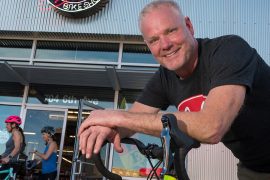A. Michael Perry and his wife Henriella started the Heritage Farm Museum and Village to preserve West Virginia’s Appalachian Heritage.
By Marla Brannan
HQ 45 | AUTUMN 2002
Mike Perry has been many things in his lifetime: lawyer, banker, university president, father, husband, grandfather, farmer, collector. But his goal has always been the same: to do the best he can for his family and his home state. Now that he’s retired, Perry has time to don a couple new hats: educator, historian and full-time promoter of West Virginia. During a recent festival at his ever evolving Heritage Farm Museum & Village, he spoke of West Virginia’s rich heritage and the legacy he wants to leave for the future.
Perry sums up the past, present and future of West Virginia in one word: change. He jokes that “the only person who likes change is a wet baby,” but points out that our Appalachian ancestors’ acceptance of change was one reason they survived in the rugged mountains of our state.
Giving West Virginians perspective to help them foster change and form a vibrant future is what Perry and his wife of 44 years, Henriella, are doing at their farm. Instead of just philosophizing about change, they have done something about it. The farm, located on Harvey Road in Wayne County, celebrates Appalachian history in brilliant detail covering everything from the history of transportation to the history of the broom. There’s an authentic one room schoolhouse, a church, several brimming museums, a blacksmith shop, a feed mill and a sawmill – all in working condition. A tour of the Progress Building takes the observer through a late 19th and early 20th century kitchen, displays the history of quilting, and also houses a 50s style doo-wop soda fountain.People assume that the lightening pace of current progress in computer technology, biomedical science or genetic engineering ranks the current generation at the top in terms of dealing with change. But what about moving from horse and buggy to train to automobile to airplane over the span of one’s life? Or from a scrub board to a hand wringer to a washing machine? Previous generations of West Virginians handled these changes extraordinarily well – but what is our current attitude toward change? Do we balk at it or simply ignore it? Do we embrace, promote it and foster it? Perry believes that winners embrace change because it gives them new perspective.

Every May, more than 200 volunteers arrive at Heritage Farm from as far away as western Kentucky, Pennsylvania and North Carolina to bring the Village to life for the Spring Festival Day. Lectures are given in the school, music streams from the church, and the hills echo with the sound of the sawmill’s vintage tractor letting off steam. The blacksmith shop is fired up and everywhere people demonstrate arts and crafts integral to our heritage such as basket weaving, coopering, rope making and weaving. Many volunteers dress in period costumes ranging from trappers to Civil War soldiers to little girls in braids and bonnets. It’s completely authentic and wholly consuming; a visitor feels he or she is actually breathing antique air.

Ironically, the Perrys’ purpose at Heritage Farm isn’t to take us back to the “good old days” or even celebrate them: It’s to give West Virginians perspective on today and tomorrow.
“At the Heritage Farm Museum & Village we study the past to gain an appreciation of the present and prepare and plan for the future,” states Mr. Perry.
Take brooms, for example. Brooms were once made by one man who owned his own broom making shop. He made them by hand on a foot powered device that helped him wind heavy wire around the head of straw. Then along came a new fangled machine in 1881 that required less man power and made more brooms for less money. Consumers discovered the cheaper brooms and created demand. The broom maker didn’t know how to use the new machinery and no one was buying his more expensive brooms. The hand made broom shop soon went out of business. One man calls it progress; another calls it the end of his livelihood.

Obviously, modern correlations can be drawn to businesses and even farms that use technology like global positioning, computers and the internet; those who don’t get left behind. What the Museum demonstrates is that, like it or not, change happens. But the choice is yours: You will either let it happen to you or make it happen because of you. If we embrace it as our ancestors did, we will be the couriers of change.
One practical way Heritage Farm serves the future of West Virginia is by providing the actual space to facilitate change. The Museum has several inns as well as two large conference spaces. In fact, the deal to bring Amazon.com to Huntington was hashed out at Heritage Farm.
Every bit as important, however, is the Perrys’ hope that visitors to Heritage Farm, especially those from West Virginia, will take with them a desire to emulate their ancestors. That desire grows from the realization that our Appalachian roots are nothing of which to be ashamed, that our predecessors were filled with pride, ingenuity, creativity, determination and a solid work ethic.
But somewhere along the way West Virginians got left behind and started to forget those basic principles. We have, in the eyes of the American media, gone from a people with dreams of freedom and land to a welfare society where unfortunately many children dream of “drawing just like my Daddy” – drawing a welfare check, that is.

How did it happen? When Perry was growing up, Huntington was booming, mostly because of factories built here due to the river, rail and readily available raw materials. Then came major highways and 18-wheelers. The scope of competition covered a wider area due to speedier delivery times and faster access to cheaper raw materials. But highways were 10 times more expensive to build in West Virginia’s mountainous terrain than on the flat plains of Ohio or Indiana. Many Huntington factories closed down or went elsewhere – so much for our past.
Thanks to the nature of change, however, the Tri-State is now as well-positioned as any area in America. Because the scope of competition has continued to expand through airplanes, overnight deliveries, fax machines, teleconferencing and especially the internet, Huntington can now attract a wide variety of businesses and companies. In fact, companies like Amazon.com and Toyota have already begun to realize the attractiveness of West Virginia and have capitalized on it.

“Our workers are among the best in the world, in large part because of the work ethic they inherited from their ancestors. New companies also are interested in the quality of life for their employees. Our area is certainly one of the best places to live, work and play,” explains Perry.
Perry feels that now is an exciting time of opportunity for our region and our state, but several things need to change before we will be successful. He supports a new regional airport and other changes to the local infrastructure that will help build a brighter future. But most importantly, he wants West Virginians to reinherit the pride, work ethic and determination of our ancestors.
Mike and Henriella Perry are obviously concerned with what kind of legacy they will leave behind. They are now grandparents several times over and want their grandkids, and others, to be proud of their heritage as West Virginians.

And, they want the people of the Mountain State to be able to earn good livings without being forced to leave home. Knowing they won’t always be around to guide their grandchildren has made the Perrys realize that they want to be couriers of change.
Anyone who’s been to Heritage Farm Museum & Village knows the Perrys’ legacy is something of which they – and in truth, all of us – can be proud.
The Heritage Farm Museum & Village is open Monday thru Saturday, 10 a.m. to 3 p.m. For more information, call (304)522-1244 or visit www.heritagefarmmuseum.com.




